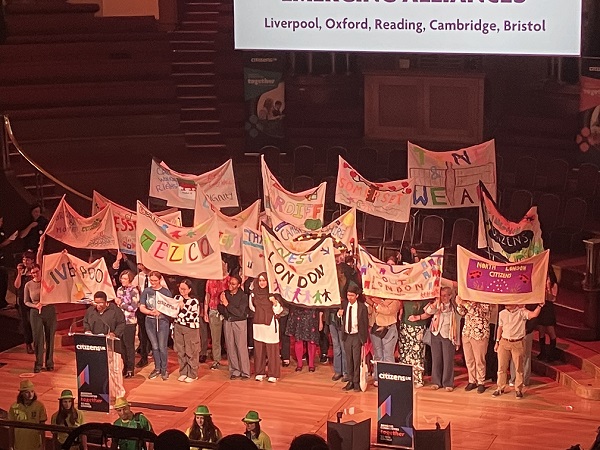Community organising improved my life, what part can it play in national renewal?
Posted on: 9 July 2024 by Belinda Tyrrell in Blog

In this blog, Belinda reflects on the role of community organising in improving outcomes for communities and its potential role in mission led government.
I should start this blog by saying that my life has been shaped by people powered change. When I was growing up, I lived in a terraced house which if I was being polite was in a state of disrepair. After failed attempts to secure interventions from the local authority, my parents and our neighbours across Liverpool’s Weller Streets decided that we just could not live like that any longer and formed a housing cooperative.
Within a couple of years, we moved from that terraced house to a brand-new home with a front and back garden. Moving into that house changed our lives, it gave us a sense of security which we did not have before. It amazes me to think that this was achieved by ordinary people coming together and building relationships with those who had the power and expertise to help them achieve the change they wanted.
I believe that public policy can only be improved by bringing those with the relevant lived experience into the conversation. There are multiple ways in which we can do this, but community organising is the one of the most impactful ways in which citizens can shape change.
On Monday the 1st of July, I joined two thousand members of the eighteen local chapters of Citizens UK in Westminster for the Citizens UK General Election Assembly to see the power of community organising in action.
This non-partisan event brought together members of Citizens UK with representatives from each of the three main political parties in England and Wales with the aims of strengthening relationships and securing commitments for the social justice priorities outlined in the Citizens UK Manifesto.
The assembly is carefully choreographed, and underpinned by years of work which has taken place across the local chapters of Citizens UK to build trust, strengthen relationships, understand routes of power, and develop leaders. During the evening, we listened as people came on to the stage to present the Manifesto priorities by sharing their testimonies, we heard about the change created by citizen actions and celebrated the roll call of the member institutions of Citizens UK. This all came together to send the message of “our people, our power”.
This power is the reason that this assembly has a track record of attracting leading politicians, including Sir David Cameron, Gordon Brown, Nick Clegg, Ed Miliband and Sajed Javed. This time around the parties were represented by Deputy Leader of the Labour Party Angela Raynor, Conservative Parliamentary Candidate Sara Gezdari and the Chair of the Liberal Democrats Manifesto Working Group, Lord Newby.
During the assembly, the testimonies of Citizens UK members, including Rachel from Nottingham who is a care worker, Eddy from Birmingham who is navigating the citizenship pathway, and Saynab form London whose home is in disrepair, anchored priorities of the manifesto in real lives. This sharing of stories enabled the representatives of the political parties to show empathy and respond in a way which felt authentic and share parts of their own stories. By design, this also made it more difficult for politicians to not give a positive response to the asks for action. Indeed, all three representatives of the main English political parties agreed to continue to meet with Citizens UK once a month, to connect them with relevant ministers, and work with Citizens UK on their social justice priorities including the real living wage, housing, and citizenship pathway.
Walking away from the event, I felt like I had witnessed something powerful as everyday people just like my mum and dad had secured commitments to work together to achieve the change our communities want to see. It is notable that the tone and vocabulary of his first speech to the country as Prime Minister, Sir Keir Starmer, gave an indication that this government is seeking to build relationships with citizens. He closed the speech by inviting “you all to join this government of service in the mission of national renewal” Now might be the time when participatory approaches including community organising become a standard part of policy design and delivery.
Keywords: .